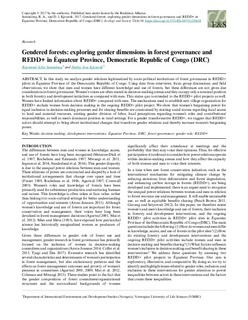| dc.contributor.author | Samndong, Raymond Achu | |
| dc.contributor.author | Kjosavik, Darley Jose | |
| dc.date.accessioned | 2018-10-17T08:02:47Z | |
| dc.date.available | 2018-10-17T08:02:47Z | |
| dc.date.created | 2018-01-30T15:35:50Z | |
| dc.date.issued | 2017 | |
| dc.identifier.citation | Ecology & society. 2017, 22 (4), . | nb_NO |
| dc.identifier.issn | 1708-3087 | |
| dc.identifier.uri | http://hdl.handle.net/11250/2568388 | |
| dc.description.abstract | In this study we analyze gender relations legitimatized by socio-political institutions of forest governance in REDD+ pilots in Équateur Province of the Democratic Republic of Congo. Using data from interviews, focus group discussions, and field observations, we show that men and women have different knowledge and use of forests, but these differences are not given due consideration in forest governance. Women’s voices are often muted in decision-making arenas and they occupy only a nominal position in both forestry and development initiatives as compared with men. This status quo is extended to the REDD+ pilot projects as well. Women have limited information about REDD+ compared with men. The mechanisms used to establish new village organization for REDD+ exclude women from decision making in the ongoing REDD+ pilot project. We show that women’s bargaining power for equal inclusion in decision-making processes and for sharing benefits are constrained by existing social norms regarding local access to land and material resources, existing gender division of labor, local perceptions regarding women’s roles and contributions/responsibilities, as well as men’s dominant position in rural settings. For a gender transformative REDD+, we suggest that REDD+ actors should attempt to bring about institutional changes that transform gender relations and thereby increase women’s bargaining power. | |
| dc.description.abstract | Gendered forests: exploring gender dimensions in forest governance and REDD+ in Équateur Province, Democratic Republic of Congo (DRC) | |
| dc.language.iso | eng | nb_NO |
| dc.relation.uri | https://www.ecologyandsociety.org/vol22/iss4/art34/#abstract | |
| dc.rights | Attribution-NonCommercial-NoDerivatives 4.0 Internasjonal | * |
| dc.rights.uri | http://creativecommons.org/licenses/by-nc-nd/4.0/deed.no | * |
| dc.title | Gendered forests: exploring gender dimensions in forest governance and REDD+ in Équateur Province, Democratic Republic of Congo (DRC) | nb_NO |
| dc.title.alternative | Gendered forests: exploring gender dimensions in forest governance and REDD+ in Équateur Province, Democratic Republic of Congo (DRC) | nb_NO |
| dc.type | Journal article | nb_NO |
| dc.type | Peer reviewed | nb_NO |
| dc.description.version | publishedVersion | |
| dc.source.pagenumber | 14 | nb_NO |
| dc.source.volume | 22 | nb_NO |
| dc.source.journal | Ecology & society | nb_NO |
| dc.source.issue | 4 | nb_NO |
| dc.identifier.doi | 10.5751/ES-09753-220434 | |
| dc.identifier.cristin | 1556881 | |
| dc.relation.project | Norges forskningsråd: 230296 | nb_NO |
| cristin.unitcode | 192,13,1,0 | |
| cristin.unitname | Institutt for internasjonale miljø- og utviklingsstudier | |
| cristin.ispublished | true | |
| cristin.fulltext | original | |
| cristin.qualitycode | 1 | |

